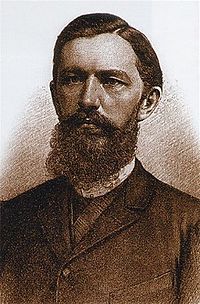- Oleksander Barvinsky
-
Oleksander Barvinsky
Олександр Барвінський
Oleksander Barvinsky Secretary of Education of West Ukraine In office
November 9, 1918 – January 4, 1919Prime Minister Kost Levytsky Preceded by post created Succeeded by Ahenor Artymovych Chairman of Shevchenko Scientific Society In office
1893–1897Preceded by Julian Celewycz Succeeded by Mykhailo Hrushevsky Leader of Catholic Social Movement In office
1896–1926Deputy of Imperial Council In office
1891–1907In office
1917–1918Deputy of Galician Diet In office
1894–1904Personal details Born Oleksandr Hryhorovych Barvinsky
8 June 1847
Shliakhnyntsi, Kingdom of Galicia and LodomeriaDied 25 December 1926 (aged 79)
Lviv, PolandNationality Ukrainian Political party Christian Social Party Alma mater Lviv University Occupation Academician, politician, pedagogue Religion Ukrainian Catholic Oleksander Barvinsky (Ukrainian: Oлександр Барвiнский ) (June 8, 1847 – December 25, 1926) was an important western Ukrainian cultural figure and politician, a founder of the Christian Social Party in western Ukraine. He also was a member of the Austrian parliament, chaired the Shevchenko Scientific Society and held the post of secretary of education and religious affairs of the West Ukrainian National Republic. It was during his chairmanship that the Shevchenko Scientific Society was turned into a well established academy of sciences.
Contents
Biography
Oleksander Barvinsky was born on June 8, 1847 in Shliakhnyntsi, a village near Ternopil in western Ukraine (at the time, part of Austria–Hungary), into the family of a Ukrainian Catholic priest. From 1868 he began teaching at gymnasiums (secondary schools) in western Ukraine until 1888, when he began teaching at Lviv's teacher's seminary and later the theological seminary. Collaborating with Panteleimon Kulish, Barvinsky helped create textbooks for Ukrainian schools, and was largely responsible for the use of Ukrainian orthography and for the term of Ruthenian-Ukrainian within the schools in eastern Galicia.[1]
In 1890, Barvinsky was one of the initiators of the "New Era" policy among Ukrainian political leaders, calling for rapproachment between Poles and Ukrainians. Even after most Ukrainian leaders abandoned this approach by 1894, Barvinsky along with Anatole Vakhnianyn refused to reconsider their positions and together with him formed the political party "Catholic Ruthenian-Social Union". A prominent community organizer and Ukrainophile activist, in 1891 he was elected to the Austrian parliament in Vienna, where he served until 1907. From 1894 until 1904 he was a member of the local Galician Diet. In 1917 Barvinsky became a member of the Austrian upper chamber (House of Lords). When Austria-Hungary fell apart following the First World War, Barvinsky became the minister of education and religious affairs of the West Ukrainian National Republic,[2] retiring from political life after the Poles captured the capital of Lviv.[1]
References
Bibliography
- Small Dictionary of History of Ukraine/Chief Editor Valeriy Smoliy. "Lybid". Kiev, 1997.
- Melnychuk,B. Khanas,V. Oleksandr Hryhorovych Barvinsky/Ternopil Encyclopedic Dictionary. Vol.1. "Zbruch" Ternopil, 2004. ISBN 9665281976
- Seredyak,А. Outline of Prosvita history. Lviv, 1993. pp.120-121
- Kachkan,V. Ukrainian Social Studies in names. Vol.2. Kiev, 1997. pp.45-54
- Liberny,О. Oleksandr of the Barvinsky constellation... "Svoboda". 1997
- Chornovil,І. Political realism of O.Barvinsky "Suchasnist". #1. 1998. pp.99-105
External links
Categories:- 1847 births
- 1926 deaths
- People from Ternopil Raion
- Ukrainian Austro-Hungarians
- Ukrainian historians
- Ukrainian parliamentarians
- Austrian parliamentarians
- Ukrainian politicians before 1991
Wikimedia Foundation. 2010.
